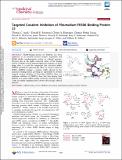Notice
This is not the latest version of this item. The latest version can be found at:https://dspace.mit.edu/handle/1721.1/133584.2
Targeted Covalent Inhibition of Plasmodium FK506 Binding Protein 35
Author(s)
Atack, Thomas C; Raymond, Donald D; Blomquist, Christa A; Pasaje, Charisse Flerida; McCarren, Patrick R; Moroco, Jamie; Befekadu, Henock B; Robinson, Foxy P; Pal, Debjani; Esherick, Lisl Y; Ianari, Alessandra; Niles, Jacquin C; Sellers, William R; ... Show more Show less
DownloadPublished version (2.346Mb)
Publisher with Creative Commons License
Publisher with Creative Commons License
Creative Commons Attribution
Terms of use
Metadata
Show full item recordAbstract
FK506-binding protein 35, FKBP35, has been implicated as an essential malarial enzyme. Rapamycin and FK506 exhibit antiplasmodium activity in cultured parasites. However, due to the highly conserved nature of the binding pockets of FKBPs and the immunosuppressive properties of these drugs, there is a need for compounds that selectively inhibit FKBP35 and lack the undesired side effects. In contrast to human FKBPs, FKBP35 contains a cysteine, C106, adjacent to the rapamycin binding pocket, providing an opportunity to develop targeted covalent inhibitors of Plasmodium FKBP35. Here, we synthesize inhibitors of FKBP35, show that they directly bind FKBP35 in a model cellular setting, selectively covalently modify C106, and exhibit antiplasmodium activity in blood-stage cultured parasites.
Date issued
2020Journal
ACS Medicinal Chemistry Letters
Publisher
American Chemical Society (ACS)